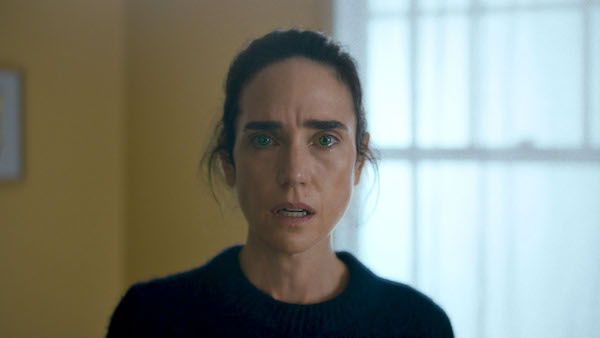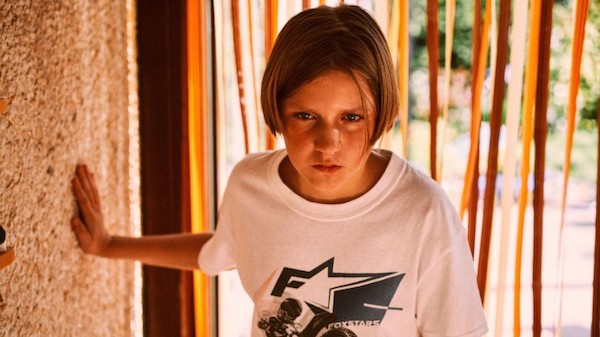Sundance Film Festival 2023 Dispatch #2: Retreating
By Peg Aloi
My second crop of Sundance screenings features three films that are all about women who, on some level, retreat from certain aspects of their lives: their pasts, their trauma, their public persona.

Jennifer Connelly in Bad Behaviour. Photo: Sundance website.
Bad Behaviour is the feature filmmaking debut of Alice Englert, an accomplished young actress (You Won’t Be Alone, Ratched) who happens to be the child of acclaimed Australian director Jane Campion (who has a brief cameo). The film is a self-consciously quirky story of Lucy (Jennifer Connelly) and her daughter Dylan (Englert) who have a loving if somewhat tense relationship. Lucy, a former child star who was in a popular action hero franchise, arrives at a healing forest retreat led by gentle-voiced and rather goofy guru Elon (Ben Whishaw). Once there she’s asked to avoid using her electronic devices, but blithely ignores this rule as best as she can, despite the fact she is only able to get a very limited phone signal. She’s in touch with Dylan who is thousands of miles away shooting a film, for which she is employed as a stunt performer.
Lucy projects an angry, anti-social vibe. Despite trying to engage with the exercises at the retreat, and even striking up a good rapport with Elon (who secretly sneaks outside for smoke breaks where Lucy is trying to sneak a smartphone signal), she’s clearly struggling with long-buried pain. Meanwhile Dylan has to deal with various various self-induced crises, including challenges with lovers, despite being good at her job. When mother and daughter meet up unexpectedly we see that their loving relationship has cracks in need of mending. The cast is wonderful here, transcending a script that is perhaps too ambitious: the tone is uneven at times and the overlay of dark humor comes off as a bit forced. Still, Englert’s deep sensitivity as an actor is apparent; she may well prove to be a directorial presence worth watching. This effort suggests the early work of Jane Campion, which was oddly beautiful and frank in its depictions of sex and obsession and dysfunction. This daughter of such a bold talent may well follow suit one day.

Rosa Marchant in Until It Melts. Photo: Sundance website.
The Belgian drama Until It Melts is a sensitively-rendered portrait of lingering childhood trauma. At times it is quite harrowing to watch. The story begins with twenty-something Eva (Charlotte de Bruyne), who works behind the scenes on a film crew. Her younger sister is moving out to live with her boyfriend; she berates Eva for continuing to hold a grudge against their abusive parents. Then Eva, alone and off-kilter, has an awkward “date” with a co-worker. She behaves inappropriately and retreats in embarrassment. Learning of a memorial celebration in her hometown, ten years after the death of a childhood friend, Eva spirals into memories of the summer she turned 13, when her two best friends, brothers of the boy who died, urged Eva to join them playing a cruel game that exploited other girls her age.
Played by Rosa Marchant, young Eva is a sensitive child who is desperate to fit in. Her eagerness to please leads to a charged situation with her friends that spins out of control, ending in a horrific act of betrayal and violence. Director Veerle Baetans draws astonishing performances from the entire cast, particularly Marchant and de Bruyne. The script, adapted from Lize Spit’s novel and co-written with the author and Maarten Loix (Bitter Flowers), is an intense and moving exploration of the explosive emotions of childhood, with a focus on the impact of extreme adolescent trauma. This is a difficult film to watch, but its psychological nuance and artfulness cannot be denied. When It Melts won Sundance’s World Cinema (Dramatic) Special Jury Award for Performance.

Image from The Disappearance of Shere Hite. Photo: Iris Brosch.
From the director of the award-winning documentary Crip Camp: A Disability Revolution (which won an Audience Award at Sundance in 2020) comes this electrifying profile of a hugely-influential author who altered the landscape of sexuality in America. While studying at Columbia University, young Shere Hite worked as a fashion and illustrators’ model. Frustrated by the dismissive attitudes of male-dominated academia, she was determined to conduct original research in female sexuality. Following in the footsteps of sex researchers Kinsey and Masters and Johnson, Hite distributed lengthy anonymous questionnaires to women that probed their sexual lives, focusing ontheir experience of orgasm. The findings, drawn from over 15,000 respondents were collected in a book (The Hite Report), which became one of the best-selling books of the 20th century.
Utilizing a glorious assortment of archival footage and photographs, filmmaker Nicole Newnham crafts a visual and spoken odyssey that dovetails Hite’s sensually-immersive approach to life (her stunning clothes and living spaces, her adorable dog) with a chronicle of her groundbreaking research and the people who helped her along the way. Her first book was controversial to say the least, and when she followed it up with a similar study on male sexuality, the media and public response turned nasty. Video footage of interviews where Hite is interrupted, insulted, and mocked (mostly by men) provides a powerful contrast to evidence of her work’s enormously positive social impact. Newnham sets Hite’s struggle to express her iconoclastic ideas against the shifting cultural and political powers (players include Anita Bryant, Pat Buchanan, et al) that rejected the forward strides of the feminist movement. Demoralized by the damage to her writing career, Hite eventually moved to Europe. But at the zenith of her work’s success, during a period of huge social upheaval in America, Hite helped inspire many to demand greater equality and acceptance. As the film soberly reminds us, many of the gains made have since been lost. It is a call, perhaps, to dig in our heels and do the work we all know is so important now.
Peg Aloi is a former film critic for the Boston Phoenix and member of the Boston Society of Film Critics. She taught film studies in Boston for over a decade. She writes on film, TV, and culture for web publications like Time, Vice, Polygon, Bustle, Mic, Orlando Weekly, and Bloody Disgusting. Her blog “The Witching Hour” can be found on substack.
